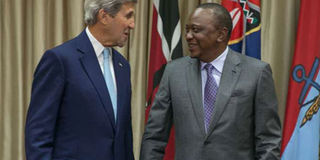Kerry says US won’t take sides in Kenya polls

US Secretary of State John Kerry and Kenya's President Uhuru Kenyatta at State House, Nairobi on August 22, 2016. Mr Kerry advised Igad through President Kenyatta to support Kiir’s move to reach out to allies of Riek Machar. AFP PHOTO
What you need to know:
- At a press conference in Nairobi, Mr Kerry said next year's elections will determine how Kenya steers clear of the violence it had in 2008 before passing a new Constitution in 2010.
- Last week, a joint parliamentary select committee completed a report with suggestions that could see current commissioners at the Independent Electoral and Boundaries Commission (IEBC) leave office before the end of September and new ones appointed.
- Mr Kerry, who earlier met with President Uhuru Kenyatta at State House, said he appreciated the steps made in making those reforms, but said leaders must refrain from any violence.
United States Secretary of State John Kerry on Monday said his country will be a neutral party ahead of Kenya’s elections in 2017, but asked Kenyan leaders to resolve electoral reform differences peacefully.
Mr Kerry, who travelled to Nairobi to discuss regional security and peace, said Kenya’s experience with past post-election skirmishes should encourage leaders to peace.
“Kenya has come a long way since the elections in 2007. It is up to leaders on all sides to ensure that violence that took place in the aftermath of that election is never repeated,” he told a press conference at the Kempinski Hotel in Nairobi.
He added: “United States does not favour one party over another. But we strongly support a fair, accountable, transparent, orderly, credible, non-violent electoral process and we will do everything we can to assist Kenyans as they work towards that goal.”
Mr Kerry met with President Uhuru Kenyatta at State House before meeting with opposition leaders at a separate event in Nairobi where the message was the same: Kenya’s peaceful elections depended on their cool heads.
His comments at the Kempinski hotel came as Kenyan leaders haggled over the form that changes to the electoral system should take. Last week, a joint parliamentary select committee completed a report with suggestions that could see current commissioners at the Independent Electoral and Boundaries Commission (IEBC) leave office before the end of September and new ones appointed.
But politicians from Cord and Jubilee are still bickering over whether Jubilee benefited more from the report.
FURTHER CONSULTATIONS
The report by the parliamentary team is expected to be approved by both Houses: The National Assembly and the Senate, but Cord leader Raila Odinga has called for further consultations on how to appoint the new commissioners.
The reference to neutrality is important as the US and other Western countries were largely accused of supporting some politicians during the run-up to the 2013 elections which President Kenyatta won.
At the time, the President and his deputy, then Eldoret North MP, William Ruto, were facing charges of crimes against humanity at the International Criminal Court.
This year, the US, the UK and other Western countries have been supporting electoral reforms through a programme known as Support to Electoral Reforms and Processes.
When opposition leaders went to the streets to demand a new polls team, the diplomats advised them to stop protests and engage in talks with the government.
It is the same message Mr Kerry gave Kenyan politicians. The US will spend Sh25 billion to support civic education programmes, encourage women participation in elections, strengthening the polls team as well as electoral dispute resolutions mechanisms ahead of the 2017 elections.
The report presented to Parliament has had a heavy contribution from Western diplomats. But Mr Kerry put the entire weight of responsibility on leaders in both the government and the opposition, saying next year’s elections must have the contribution of all Kenyans.
“In today’s world, it is really hard to have prosperity without good governance. I urge that disagreements on policy and process be resolved peacefully,” he said.




